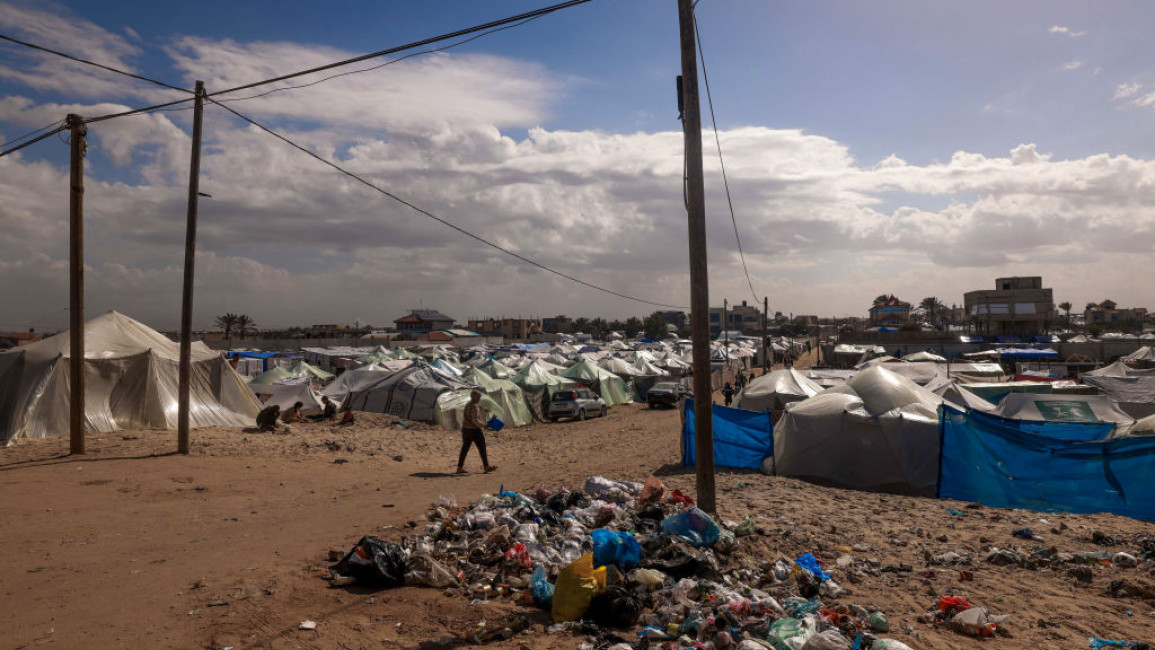Aid agencies: Israel cannot 'offload' Gaza responsibility
Humanitarian groups said on Thursday they had run out of words to describe the horrors unfolding in Gaza, stressing that states and especially Israel could not "offload" responsibility for the carnage onto aid workers.
There have been growing international warnings after Israel vowed to push ahead with a major operation in southern Gaza's Rafah, where 1.5 million Palestinians remain trapped.
Humanitarians have warned that carrying out aid operations in the area could soon be impossible.
"We are reaching the barriers of language in describing the humanitarian situation," ICRC president Mirjana Spoljaric told a Geneva briefing for diplomats on events in Gaza.
Israel has accused humanitarian actors of not doing enough to bring in aid. Particular criticism has been directed at the ICRC, which stands accused of failing to visit the hostages and provide them with adequate assistance.
The Red Cross chief told the diplomats their countries were responsible for ensuring the Geneva Conventions on human treatment are upheld.
"It is not in your interest to offload (that) responsibility... onto humanitarian actors," she said.
"If the way operations are conducted today limit our operational space to a minimum... we will not be able to resolve the problem," she added.
'An illusion of aid'
Christopher Lockyear, head of the medical charity Doctors Without Borders, agreed.
In the current situation, "when we are talking about humanitarian assistance, we're talking about an illusion of aid," he said.
United Nations aid chief Martin Griffiths warned the diplomats not to "look to the humanitarian community as a rescue brigade for the people compressed into that area" in southern Gaza.
"Conditions do not allow it," he said.
"It will not be our fault if people suffer," he insisted. "It will be the fault of those who decide to make this happen."
After more than four months of a war that has flattened vast swathes of Gaza, displaced most of the territory's population and pushed people to the brink of starvation, Israeli Prime Minister Benjamin Netanyahu has insisted his country must press ahead into Rafah for "complete victory" against Hamas.
The militant group's 7 October attack, which sparked the war, resulted in the deaths of about 1,160 people in Israel, mostly civilians, according to an AFP tally based on official Israeli figures. The attack came after months of deadly Israeli raids on the occupied West Bank.
At least 28,663 people, mostly women and children, have been killed in the ensuing Israeli offensive.
Kate Forbes, president of the International Federation of the Red Cross and Red Crescent Societies (IFRC), lamented Thursday that numerous humanitarians were being killed in Gaza.
She said one volunteer she recently met in Rafah had told her: "We're all on a waiting list to die."
'Forcible displacement'
Amid fears of the coming incursion into Rafah, Griffiths rejected Israel's suggestion that people could move to safety before the onslaught.
"Evacuation to a safe place in Gaza is an illusion," he said, warning of the very real possibility that the military operation would spark a panicked "spillover" into Egypt.
Egypt's ambassador Ahmed Ihab Gamaledin, who was hosting Thursday's briefing, urged countries to "loudly reject any attempts at forcible displacement of Palestinians".
Numerous representatives from Arab and Muslim-majority nations especially also took the floor to decry what some described as a "genocide".
Israel was not present. But a number of representatives from Western nations, including the United States, the European Union and Britain, took the floor.
They reiterated their unequivocal condemnation of the Hamas attack, but also voiced alarm at the situation in Rafah.
Palestinian ambassador Ibrahim Khraishi called for "a cessation of military transfer and trade (with Israel)... and to stop the veto at the (UN) Security Council" by the United States against curbing Israel's offensive.
"We thank you for your emotions and ... for your financial support, but I think if things are going to continue, maybe there is no need for that humanitarian aid, because you will not find people to benefit from it," he said.


![Minnesota Tim Walz is working to court Muslim voters. [Getty]](/sites/default/files/styles/image_684x385/public/2169747529.jpeg?h=a5f2f23a&itok=b63Wif2V)




![Israeli officials are considering exiling Yahya Sinwar to Sudan as part of a deal to end the war [Getty]](/sites/default/files/styles/image_330x185/public/1251837582.jpeg?h=127ba027&itok=ujxSRy_f)
![Debris near Rafic Hariri International Airport [Getty]](/sites/default/files/styles/image_330x185/public/2176162423.jpeg?h=a5f2f23a&itok=MCSK9mkM)
![An Israeli air strike on Jabalia killed teenage journalist Hassan Hamad [Screengrab/X]](/sites/default/files/styles/image_330x185/public/2024-10/hassan%20hamad1.jpg?h=c12e0b96&itok=Rd_dyCVp)